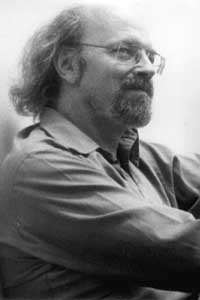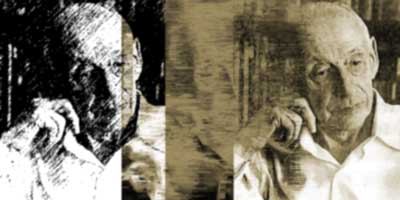‘Absence of God’ theme unites Scholem’s poetry, scholarship
By Seth SandersNews Office
 Paul Mendes-Flohr  |
Last year, for the first time, a collection of poetry written by Gershom Scholem, a prominent 20th-century scholar of Kabbalah, was published as The Fullness of Time. Last week, Paul Mendes-Flohr, Professor of Modern Jewish Thought in the Divinity School, presented a conference to reflect on the significance of the poetry.
Although many considered Jewish mysticism to be nothing more than an obscure superstition, Scholem put Jewish mysticism on the academic map worldwide. In his major works, he illuminated Kabbalah from its origins, showing it emerged as an intellectually complex and spiritually creative response to the mystery, or even the absence, of God. But in his poetry, written for friends, he reflected more darkly on the possibilities and limits of his Zionism, his scholarship and his quest for God.
Mendes-Flohr, who came to Chicago from Scholem’s old home, the Hebrew University of Jerusalem, has long had an interest in Scholem’s work. “He’s a central figure of German Jewish experience, who was engaged with many of the personalities I consider in my work, and he’s a formative figure in a variety of areas of contemporary culture, such as mysticism and the philosophy of language.”
Mendes-Flohr said Scholem’s poetry is especially interesting to consider in this light because “poetry is an area in which one explores the possibilities and limits of language.
“He didn’t write that many poems, and what we do have are poems that were evoked by a particular occasion. The poetry is important because Scholem is important; for great men, everything they leave behind is somehow important. And I think they have intrinsic merit, expressing the concerns of a central figure in the history of Zionism, the state of Israel and Jews and German.”
Scholem did not address mysticism directly in his poems, but a deep and difficult theme unites his poetry and his scholarship. Mendes-Flohr explained this theme: “the absence of God, and that absence is felt, and the void is experienced. This causes him great pain and bewilderment, and deep concern. Scholem was engaged in a mysticism that claims that when God created the world he created a void, a void in Himself and in the cosmos, in order to partake in creation. And that void remains with us, and that void is the great riddle of the creation and the divine presence, which is manifest through its absence.”
It is in this way that Scholem’s mysticism connects to his poetry and to the paradoxical way that in mysticism and poetry, “language expresses and yet it doesn’t, at the same time,” said Mendes-Flohr.
The discussion of Scholem’s poetry flows naturally from Mendes-Flohr’s research interests, which range from modern Jewish intellectual history, philosophy and religious thought to German intellectual history, and the history and sociology of intellectuals. Together with Peter Schfer, he is the editor-in-chief of the 22-volume German edition of the collected works of Martin Buber.
He also has written German Jews: A Dual Identity and is currently completing a biography of Franz Rosenzweig, Franz Rosenzweig and the Possibility of a Jewish Theology, and Post-Traditional Jewish Identities, based on the Samuel and Althea Stroum lectures.
The conference featured a performance by the New Budapest Orpheum Society, which includes its artistic director Philip Bohlman, the Mary Werkman Professor in Music and the College. The group performed some of Scholem’s favorite music titled “From Berlin to Jerusalem: The Journey of the Jewish Liederabend.”
Lectures included the presentations “Scholem, the Poet” and “Philologist’s Abyss: Some Thoughts on the Poetry of Gershom Scholem.”
Chicago’s Berthold Hoeckner, Professor in Music and the College, read Scholem’s poetry in translation as well as in the original German.
Menachem Brinker, the Henry Crown Professor of Modern Hebrew Literature in Near Eastern Languages & Civilizations, gave a talk titled “Gershom Scholem’s ‘Froehliche Wissenschaft.’” Ben Lazier, a Harper Fellow and Collegiate Assistant Professor in the Social Sciences Collegiate Division, presented “The Anarchic Promiscuity of All Living Things: Scholem’s Heresy and the Modern Jewish Predicament.”
![[Chronicle]](/images/sidebar_header_oct06.gif)